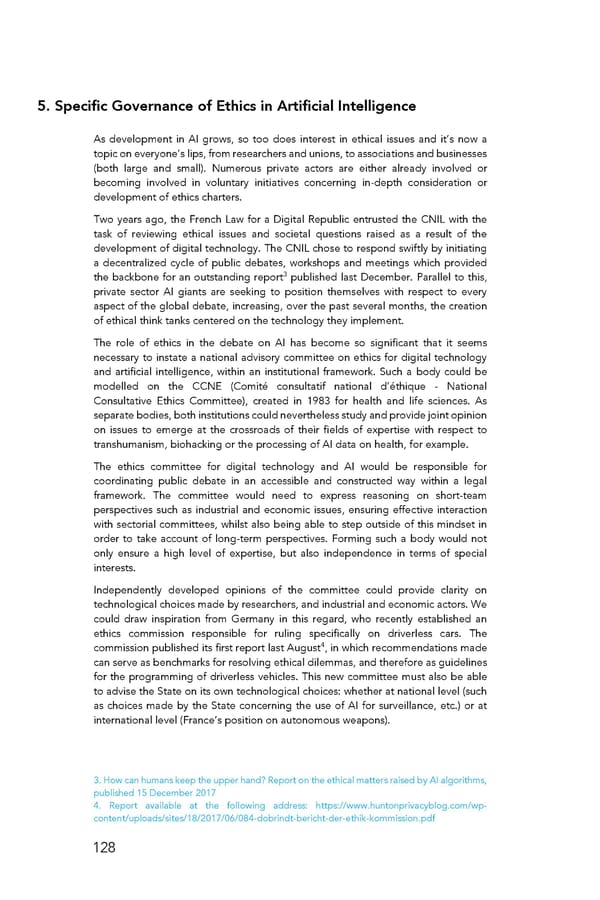5. Specific Governance of Ethics in Artificial Intelligence As development in AI grows, so too does interest in ethical issues and it’s now a topic on everyone’s lips, from researchers and unions, to associations and businesses (both large and small). Numerous private actors are either already involved or becoming involved in voluntary initiatives concerning in-depth consideration or development of ethics charters. Two years ago, the French Law for a Digital Republic entrusted the CNIL with the task of reviewing ethical issues and societal questions raised as a result of the development of digital technology. The CNIL chose to respond swiftly by initiating a decentralized cycle of public debates, workshops and meetings which provided the backbone for an outstanding report3 published last December. Parallel to this, private sector AI giants are seeking to position themselves with respect to every aspect of the global debate, increasing, over the past several months, the creation of ethical think tanks centered on the technology they implement. The role of ethics in the debate on AI has become so significant that it seems necessary to instate a national advisory committee on ethics for digital technology and artificial intelligence, within an institutional framework. Such a body could be modelled on the CCNE (Comité consultatif national d’éthique - National Consultative Ethics Committee), created in 1983 for health and life sciences. As separate bodies, both institutions could nevertheless study and provide joint opinion on issues to emerge at the crossroads of their fields of expertise with respect to transhumanism, biohacking or the processing of AI data on health, for example. The ethics committee for digital technology and AI would be responsible for coordinating public debate in an accessible and constructed way within a legal framework. The committee would need to express reasoning on short-team perspectives such as industrial and economic issues, ensuring effective interaction with sectorial committees, whilst also being able to step outside of this mindset in order to take account of long-term perspectives. Forming such a body would not only ensure a high level of expertise, but also independence in terms of special interests. Independently developed opinions of the committee could provide clarity on technological choices made by researchers, and industrial and economic actors. We could draw inspiration from Germany in this regard, who recently established an ethics commission responsible for ruling specifically on driverless cars. The commission published its first report last August4, in which recommendations made can serve as benchmarks for resolving ethical dilemmas, and therefore as guidelines for the programming of driverless vehicles. This new committee must also be able to advise the State on its own technological choices: whether at national level (such as choices made by the State concerning the use of AI for surveillance, etc.) or at international level (France’s position on autonomous weapons). 3. How can humans keep the upper hand? Report on the ethical matters raised by AI algorithms, published 15 December 2017 4. Report available at the following address: https://www.huntonprivacyblog.com/wp- content/uploads/sites/18/2017/06/084-dobrindt-bericht-der-ethik-kommission.pdf 128
 For a Meaningful AI - Report Page 127 Page 129
For a Meaningful AI - Report Page 127 Page 129